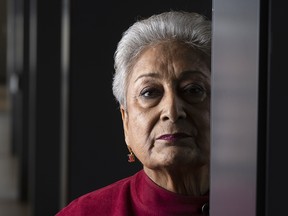World
Toronto Activist Raheel Raza Fears for Life After Iranian Hack

Raheel Raza, a 75-year-old Pakistani-Canadian journalist and activist, is confronting serious threats to her safety after being informed that Iranian hackers have infiltrated her digital communications. Raza, known for her outspoken criticism of Islamic fundamentalism, received warnings from Iranian dissidents about her compromised email security. This alarming revelation follows the assassination of her friend and fellow journalist, Imtiaz Mir, who was killed in Pakistan due to his advocacy for interfaith dialogue.
Raza learned that her email had been targeted by the Islamic Revolutionary Guard Corps (IRGC), specifically a hacking group known as APT35, or Charming Kitten. “You are on Iran’s radar,” an Iranian dissident based in California cautioned her. This warning underscored the chilling reality that Raza now faces, especially as she mourns the loss of Mir, who was attacked in September and succumbed to his injuries shortly thereafter.
Threats Following a Tragic Loss
Imtiaz Mir, recognized for his commitment to peace, was ambushed by armed assailants shortly after participating in a peace delegation to Israel. His death on September 24, 2023, was claimed by the terrorist group Lashkar e TharAllah, which explicitly cited his interfaith work as the motive for the attack. Raza expressed a strong connection to Mir’s assassination, noting that the terror group has links to the Iranian regime. “The day after Imtiaz Mir’s assassination, my family and friends received phone calls asking for my whereabouts,” she stated. “Is this a coincidence? I think not.”
Raza’s fears are amplified by the broader context of Iranian government tactics against critics abroad. In March, two men were convicted in a plot to assassinate Iranian-American journalist Masih Alinejad, highlighting a long history of violent reprisals against those who oppose the regime.
Digital Surveillance and Psychological Toll
The hack that targeted Raza included a detailed profile, revealing personal information and her advocacy against the hijab and burqa, which the report characterized as a threat to the Islamic regime. According to Raza, the IRGC’s tactics aim to intimidate and silence individuals. “It’s the Salman Rushdie syndrome. They put it out there and then some young Islamist thinks this woman is against Iran and against the regime,” she explained, drawing parallels to the attempted murder of Rushdie, who faced a fatwa for his literary work.
The IRGC’s report on Raza does not contain explicit threats but aims to expose her to potential harm. Raza emphasized her vulnerability, stating, “I’m a 75-year-old grandmother who’s just had a kidney transplant. Why would they want to have my photo out there?”
This strategy of intimidation has broader implications, affecting not only Raza’s personal safety but also her ability to advocate for human rights and against extremism.
“The idea of intimidation tactics to silence, tactics to smear, tactics to discredit journalists and activists is something that Iran does on a very large scale,”
stated Thomas Juneau, a professor at the University of Ottawa. He noted that while the scale of threats may vary, the psychological toll on targets like Raza is significant.
Raza has taken steps to enhance her digital security, changing all her passwords and contacting local law enforcement for guidance. Despite the threats, she remains resolute in her mission. “The more they try to intimidate me, the stronger my resolve to speak out against violence, against extremism, against hate,” she declared.
Born in Pakistan and relocating to Canada in 1988, Raza has dedicated her life to human rights advocacy. She has been particularly vocal in her support of Israel’s right to exist, engaging closely with the Jewish community. Raza’s commitment to fighting radicalization and extremism remains unwavering, even in the face of significant threats to her safety.
As she continues her activism, Raza serves as a reminder of the risks faced by those who challenge oppressive regimes. The message sent by the IRGC is not just a personal threat; it is a broader warning to all who oppose its ideology.
-

 Politics1 month ago
Politics1 month agoSecwepemc First Nation Seeks Aboriginal Title Over Kamloops Area
-

 World5 months ago
World5 months agoScientists Unearth Ancient Antarctic Ice to Unlock Climate Secrets
-

 Entertainment5 months ago
Entertainment5 months agoTrump and McCormick to Announce $70 Billion Energy Investments
-

 Lifestyle5 months ago
Lifestyle5 months agoTransLink Launches Food Truck Program to Boost Revenue in Vancouver
-

 Science5 months ago
Science5 months agoFour Astronauts Return to Earth After International Space Station Mission
-

 Lifestyle3 months ago
Lifestyle3 months agoManitoba’s Burger Champion Shines Again Amid Dining Innovations
-

 Technology4 months ago
Technology4 months agoApple Notes Enhances Functionality with Markdown Support in macOS 26
-

 Top Stories2 months ago
Top Stories2 months agoUrgent Update: Fatal Crash on Highway 99 Claims Life of Pitt Meadows Man
-

 Top Stories2 weeks ago
Top Stories2 weeks agoHomemade Houseboat ‘Neverlanding’ Captivates Lake Huron Voyagers
-

 Politics4 months ago
Politics4 months agoUkrainian Tennis Star Elina Svitolina Faces Death Threats Online
-

 Sports5 months ago
Sports5 months agoSearch Underway for Missing Hunter Amid Hokkaido Bear Emergency
-

 Politics5 months ago
Politics5 months agoCarney Engages First Nations Leaders at Development Law Summit





















